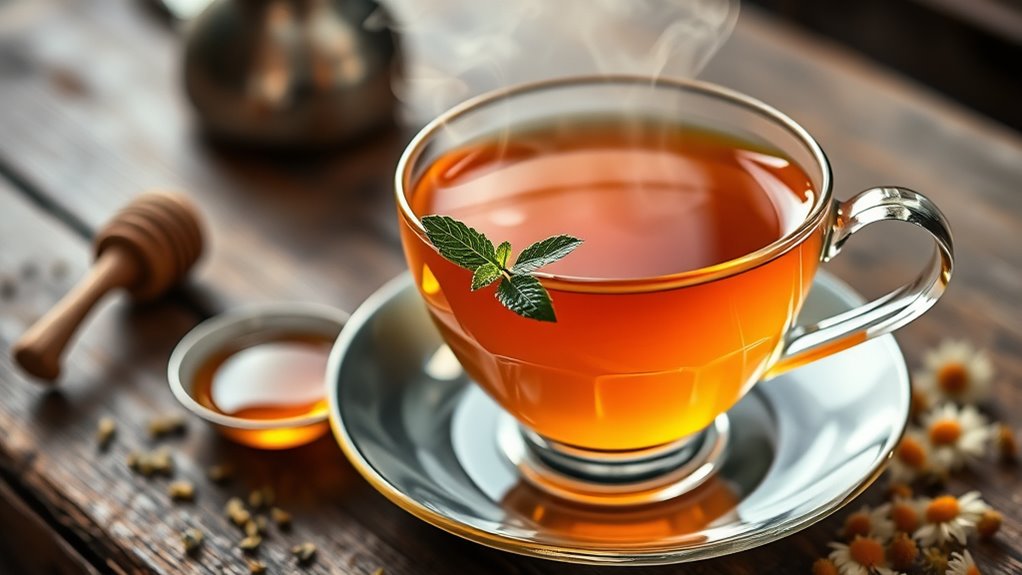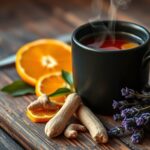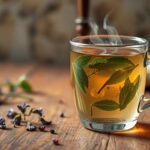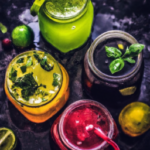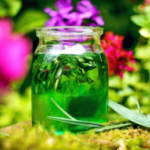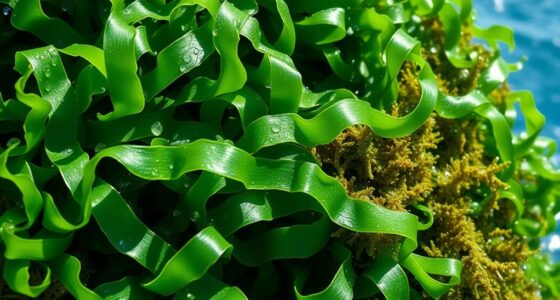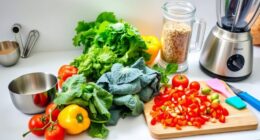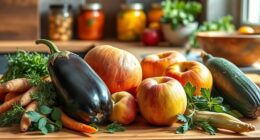Switching your nightcap from wine to herbal tea can help you relax naturally and improve your sleep quality. Herbal infusions like chamomile, valerian root, and lemon balm are caffeine-free and known for their calming effects, without disrupting your sleep cycles like alcohol or caffeinated drinks can. They’re easy to prepare and offer a comforting way to wind down. If you want to discover more about various herbal options and how they benefit your health, keep exploring.
Key Takeaways
- Herbal teas promote relaxation and sleep without the disruptive effects of alcohol or caffeine.
- Caffeine-free herbal infusions like chamomile and valerian support restful nights.
- Replacing wine with tea can improve overall health and reduce sleep disturbances.
- Tea preparation is simple, making it an easy, calming nightly routine.
- Combining various herbs enhances soothing effects and offers diverse flavors for a healthy nightcap.
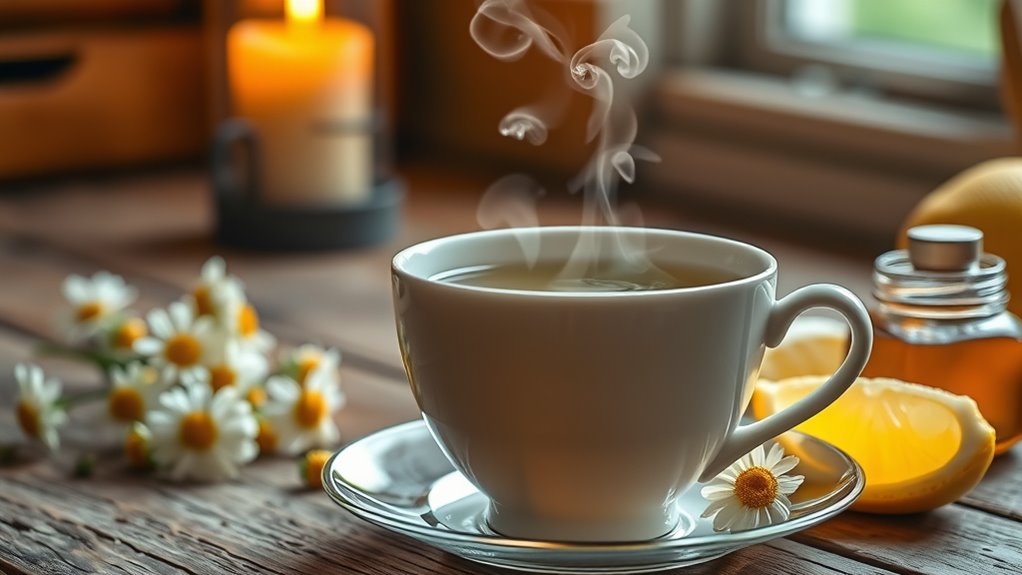
Have you ever considered replacing your evening glass of wine with a warm cup of tea? If so, you’re making a smart choice for your health. Tea offers a variety of benefits that can enhance your nightly routine, especially when you select herbal infusions. Unlike wine, which contains alcohol that can disrupt your sleep, tea can promote relaxation and prepare your body for rest. Herbal infusions, in particular, are known for their calming properties and are naturally free of caffeine, making them ideal for winding down. These teas are crafted from dried herbs, flowers, and fruits, offering a wide range of flavors and health benefits without the jitters or sleep disturbances associated with caffeinated beverages. Popular options like chamomile, valerian root, and lemon balm have been used for centuries to soothe nerves and encourage restful sleep. Choosing herbal infusions means you avoid the potential pitfalls of caffeine, which can stay in your system for hours and interfere with your ability to fall asleep.
Caffeine content is a vital factor when selecting a nightcap. Many traditional teas, like black, green, and white teas, contain varying levels of caffeine, which can act as stimulants and make it harder to unwind at the end of the day. If you’re sensitive to caffeine or want to make certain your evening remains tranquil, it’s best to opt for caffeine-free herbal infusions. These naturally caffeine-free options allow you to enjoy a warm, flavorful drink without risking sleep disruptions. Even some herbal teas labeled as “decaffeinated” might retain trace amounts of caffeine, so reading labels carefully or sticking to known caffeine-free herbs is a wise move. Incorporating mindful choices about caffeine intake can significantly improve your sleep quality.
The beauty of tea as a nightcap lies in its versatility. You can find herbal infusions with soothing ingredients like chamomile, which is renowned for its calming effects, or peppermint, which aids digestion and relaxes tense muscles. Some blends combine multiple herbs to enhance their sleep-inducing properties. Preparing a cup of herbal tea is simple and can become a comforting part of your nightly routine. The warmth of the tea helps relax your muscles and promotes a sense of calm, making it easier to shift into sleep. Most importantly, replacing alcohol or caffeinated drinks with herbal infusions supports better sleep quality and overall health, helping you wake up feeling refreshed and ready for the day ahead.
Frequently Asked Questions
Can Tea Replace Traditional Sleep Aids Effectively?
Tea can be an effective alternative to traditional sleep aids because herbal infusions like chamomile or valerian promote relaxation and improve sleep quality. You might find that sipping a warm cup before bed helps calm your mind and body naturally. While it may not work for everyone or replace medication entirely, incorporating tea into your nightly routine can support better sleep and reduce reliance on synthetic sleep aids.
Are There Any Teas to Avoid Before Bedtime?
You should avoid teas with herbal cautions or those you’re sensitive to before bedtime. For instance, teas containing caffeine like black, green, or some oolong varieties can disrupt your sleep. Even herbal teas like chamomile or valerian are usually safe, but if you have tea sensitivities, check ingredients carefully. Always listen to your body and consult a healthcare professional if you’re unsure about specific herbal components.
How Does Caffeine Content Vary Among Different Teas?
Imagine your sleep as a delicate flower, easily disturbed by caffeine. Different tea varieties have varying caffeine levels—black teas are the most caffeinated, followed by oolong and green teas, while herbal teas are caffeine-free. If you’re sensitive, opt for herbal or decaffeinated options. Knowing how caffeine content varies among tea varieties helps you choose the right soothing brew to enjoy without sacrificing your rest.
Can Herbal Teas Cause Allergic Reactions or Interactions?
Herbal teas can cause allergic reactions if you’re sensitive to certain herbs, leading to symptoms like itching or swelling. Be cautious of tea interactions, especially if you’re on medications, since some herbs may interfere with drug absorption or effectiveness. If you have a history of herbal allergy, it’s best to check ingredients carefully and consult with a healthcare professional to avoid any adverse effects.
What Is the Best Way to Brew Tea for Nighttime Relaxation?
You stumble upon a cozy evening and realize the best way to brew tea for relaxation is to use gentle brewing techniques. Choose water just below boiling, around 200°F, and steep your herbal tea for 5-7 minutes to maximize calming effects. Avoid over-steeping, which can cause bitterness. This ideal steeping ensures a soothing cup that helps you unwind and prepares you for restful sleep.
Conclusion
So, next time you reach for that calming tea before bed, remember you’re wielding a secret weapon capable of transforming your nights into the most peaceful, restorative slumber of your life. It’s not just a drink; it’s a magic potion that can banish stress, tame your restless mind, and turn your bedtime routine into a blissful ritual. Embrace tea as your nightly hero, and watch your nights become legendary for their serenity and rejuvenation!
Ilana has been a vegan for over 10 years. She originally made the switch for health reasons, but soon found herself becoming more and more passionate about the ethical and environmental implications of a vegan lifestyle. Ilana is the author of The Graceful Kitchen, a blog all about veganism. She loves to cook up delicious and nutritious vegan meals, and share her recipes with others who are interested in leading a cruelty-free life. Ilana is also a strong advocate for using whole foods as the foundation of a healthy diet, and believes that going vegan is one of the best ways to achieve this.
